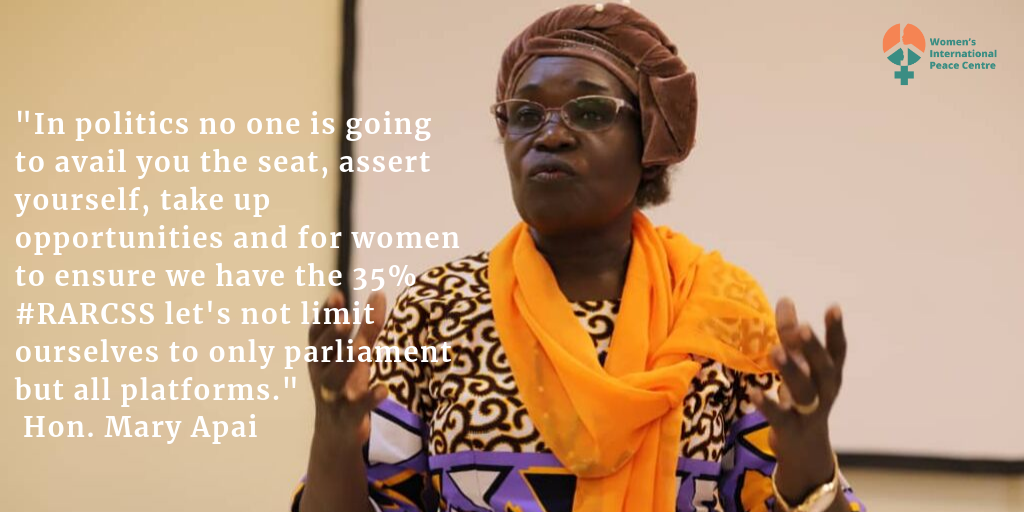Reclaiming our Space; Women influencing Multiparty Democracy
On the 26th to 27th September, Women’s International Peace Centre, in partnership with Community Empowerment for Progress Organization (CEPO) and Eve Organization for Women Development convened a two days Think Tank under the theme; “Reclaiming our Space; Women influencing Multiparty Democracy” for Women in Political leadership to reflect on strategies of enhancing the influence and strategic participation of women in multi-party political dispensation and national development. The Think Tank brought together 15 women politicians from 5 political parties, Ministry of Gender, and CSOs.
In August 2015, following almost 2years of on-and-off peace negotiations mediated by the Intergovernmental Authority on Development (IGAD), parties to the conflict and other stakeholders signed the Agreement on the Resolution of the Conflict in the Republic of South Sudan (ARCSS) in Addis Ababa, Ethiopia. The agreement provided for the formation of a Transitional Government of National Unity (TGoNU) and for national elections after two and a half years. It also envisaged broad security sector reform, transitional justice, and a constitutional development process. In December 2017, the High Level Revitalisation Forum commenced resulting in the signing of the Cessation of Hostilities Agreement (COHA) in December 2017, the Declaration of Principles in February 2018, the Khartoum Declaration Agreement (KDA) in June 2018 and the Revitalized Agreement on the Resolution of the Conflict in the Republic of South Sudan (R-ARCSS) on the 12 September in Khartoum, Sudan. In all these processes, women played key roles as mobilisers, advocates, mediators and negotiators. Organized under the auspices of the South Sudan Women’s Coalition, women pushed for inclusivity and secured space for the technical team to access the negotiation venues in Addis Ababa and Khartoum. They also influenced the peace agreement to Include a provision to have at least 35% affirmative action /women representation in all committees and for the implementation of the agreement and at all levels of decision making.
Our Key objective was to strengthen debate on women’s participation and influence in post conflict governance and decision making in South Sudan and specifically providing a space for critical dialogue and analysis on women’s engagement and influence in politics and national development for meaningful gender equality and equity and also develop a strategic agenda to strengthen capacity of women in decision making.
Protecting women’s space in politics is especially important in the conflict resolution area. Despite women’s longstanding role in informal dispute resolution, their near absence from peace talks and similar international security processes & mechanisms requires particular attention.

Ms. Jackline Nasiwa presents two papers on #UNSCR1325 and its linkage to the Revitalised Agreement on the Resolution of the Conflict in the Republic of South Sudan (R-ARCSS) and Women and Peace building framing in South Sudan in line with R-ARCSS implementation.

